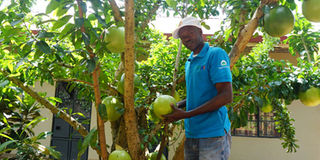How value addition to fruits boosts his income

Steven Balyejusa holds a fruit on his farm in Mityana. He adds value to most of the friuts making jam and wine. PHOTOs by Phionah Nassanga
What you need to know:
Steven Balyejjusa adds value to pumpkins, tomatoes, bananas, hibiscus, pineapples making jam, wine and juice that he sells mainly in major towns such as Masaka, Mityana, Mpigi and Kampala, writes Phionah Nassanga.
Upon harvesting crops, farmers become anxious to sell them as soon as possible before they get spoiled.
Knowing they are desperate and scared of even losing their capital, consumers take advantage of the situation thus offering them the lowest prices.
This leaves many regretting ever joining the agriculture sector. However, today many are embracing value addition.
Before 2017 Steven Balyejjusa was running a supermarket with a small organic farm in his back yard in Bweyogerere Kakajjo zone, Wakiso District, but business was not doing well.
His vegetables and fruits were being bought at the lowest price. Devastated about everything, he was then tipped by one of his customers about a four-month farmers training that was to take place in Mityana District.
“The customer knew I had interest in farming, he gave me a contact number of a one Samuel Nyanzi. Upon calling him I was asked to raise Shs1.2m for the training. I sold off the supermarket to help me raise the needed amount of money. I was then admitted to Rural Community in Development (RUCID) College, Mityana with 49 other people for the training,” he explains.
He says that concentrating on organic farming and food processing gave him an insight of what he could do best. He went from the thought of selling fresh produce to processing juice and then making wine.
After his four-month training, Balyejjusa requested Nyanzi the director at RUCID to let him stay and carry out his newly gained skills from the college’s premises. “I had nowhere to go at that moment.”
Starting
“During the training we were put in groups of seven and each tasked to produce different products such as pumpkin cakes, juices, jam that we would sell in Mityana Town and the neighbouring trading centre. At the end of the training I had savings worth Shs35,000 which I started with.”
With a few pineapples, sugar and ginger he started his journey into value addition with pineapple-ginger juice which he bottled and sold each at Shs1,000 and a crate at Shs20,000.
Wine processing
In the meantime, Balyejjusa asked the college director to rent a portion of college land for growing fruits. Towards the end of 2018 he calculated his personal savings, picked his own brain and with Shs40,000 he was set to start a winery.
“I started with 16 pineapples from which I processed 17 litres of pineapple wine. After packaging I was able to get 20mml bottles of wine selling each one of them at Shs20,000.”
Balyejjusa adds value to jackfruit, tomatoes, water melons, pumpkins, pineapples, bananas, hibiscus, calabash fruit and honey.
He says for each of the fruits all he needs is sugar, yeast, squeezers, extractors, blenders, clean containers and a heat source.
After blending the mixture is added to a certain amount of water and left to boil for about 40 minutes or an hour. It is then left to cool for 24 hours. You can then add sugar and yeast.
“The amount of sugar added to the solution depends on how sweet the mixture tests.”
He says fruits such as pineapples and bananas contain lots of sugar that is why you need to be careful when adding sugar.
“The solution is then kept in airtight containers and kept in clean room,” he says.
Balyejjusa does his first racking in two to three weeks depending on how much fibre a particular fruit contains. He says some fruits such as pumpkins and watermelons require constant checking because when not filtered well they give off a bad smell.
For better results Balyejjusa notes that he ferments his wine for one year and six months. Thereafter it is packaged and ready for sell.
“I sell a 20 litre jerry can of wine at Shs500,000 and 20mml bottle at Shs20,000. However if I am to ferment the wine for four years a bottle would cost Shs40,000.”
Market
Balyejjusa says he has readily available market for all his products and that on several occasions he is overwhelmed by the demand.
“This year I miss out on an order from Nyege Nyega festive, one of my customs wanted 800 bottles of wine, but it was unfortunate that wine was not ready as yet. Next year around February I will have the Valentine’s Day supply and my next will in April around Easter time.
Today Balyejjusa owns four acres of land in Mityana, where he has grown different fruits for his winery project. When he is not at the farm, he is busy training other farmers how to make different organic jams, wines and solar dried crisps.
Balyejjusa says once farmers learn how to add value to their produce they can also improve their profit margin.
“Agriculture produces have a short life span, but when we add value to them they can last longer thus avoiding losses.”
Beekeeping
After realising profits from his winery, Balyejjusa felt the need to shift to another venture which is beekeeping.
Just like the fruits he too adds value to his honey. He extracts the honey and packages it in glass containers for sell. He then collects the bee cobs for his honey wine.
“After harvesting, I collect the honey cobs, wash and place them in a container to heat. In the event you do not have the jacketed container, you can use an aluminium sauce pan. Honey does not require direct heating and neither does it require any sugar additions.




